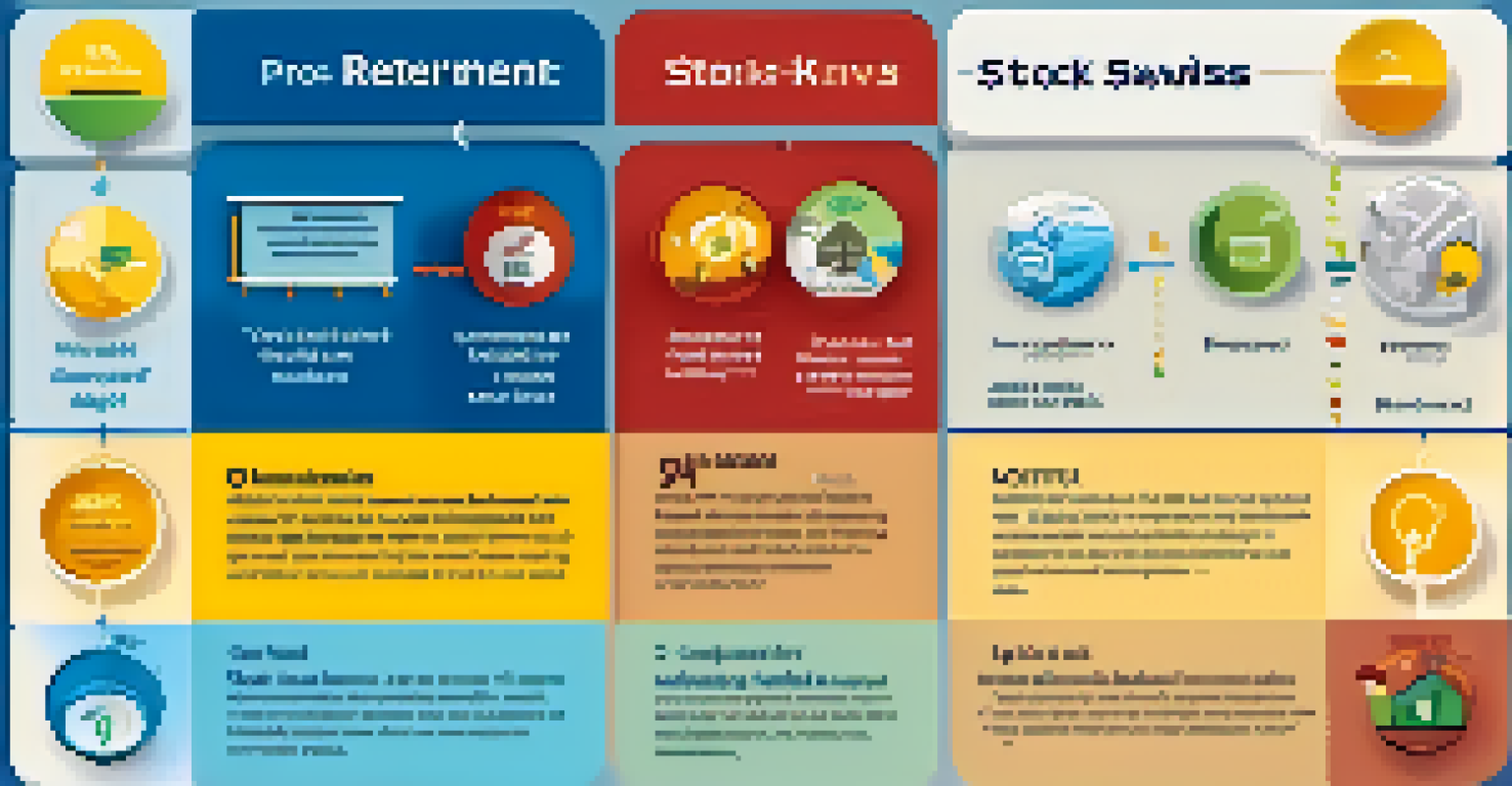Stock Options as a Retirement Savings Tool: Pros and Cons

Understanding Stock Options in Retirement Planning
Stock options are contracts that give employees the right to buy company shares at a predetermined price. This financial tool can be a valuable component of retirement planning, especially for those in rapidly growing companies. However, understanding how stock options work is crucial before incorporating them into your retirement strategy.
In investing, what is comfortable is rarely profitable.
When employees exercise their options, they can potentially purchase shares at a lower price than the market value, leading to significant profits. This potential for growth makes stock options an appealing choice for long-term savings. However, it's important to recognize that not all companies offer stock options, and their value can fluctuate based on market conditions.
Ultimately, the decision to include stock options in your retirement plan should be based on a clear understanding of their mechanics and risks. Ensuring that you have a solid grasp of your company's stock performance and market trends will help you make informed decisions.
Pros of Using Stock Options for Retirement Savings
One of the main advantages of stock options is their potential for high returns. If your company performs well, the value of your stock options can significantly increase, potentially outperforming traditional retirement accounts. This growth can lead to a more substantial nest egg for your retirement years.

Another benefit is the tax treatment of stock options, particularly Incentive Stock Options (ISOs). If certain conditions are met, you may be able to pay taxes on the profits at the long-term capital gains rate, which is typically lower than income tax rates. This tax advantage can boost your overall retirement savings.
Stock Options Can Boost Retirement
When utilized effectively, stock options can significantly enhance your retirement savings through potential high returns.
Additionally, stock options can encourage employee loyalty and engagement, as they align your interests with the company's success. When you have a vested interest in the company's performance, you may be more motivated to contribute to its growth, which can ultimately benefit your retirement savings.
Cons of Relying on Stock Options for Retirement Funds
While stock options can offer significant rewards, they also come with risks. The value of your options can diminish if the company's stock price falls, which may leave you with less than expected for retirement. This volatility can make it a risky component of your overall savings strategy.
The stock market is filled with individuals who know the price of everything, but the value of nothing.
Moreover, stock options often have expiration dates, which adds an element of urgency to your decision-making. If you forget to exercise your options before they expire, you could lose out on potential gains. This deadline can create stress, especially during market downturns.
Lastly, concentrating too much of your retirement savings in your company's stock can lead to a lack of diversification. Relying heavily on a single investment increases your exposure to risk, as a downturn in your company’s performance could significantly impact your overall financial health.
Assessing Your Company’s Financial Health
Before using stock options as a retirement savings tool, it's essential to assess your company's financial health. Understanding key indicators such as revenue growth, profit margins, and future projections can provide insights into the potential value of your stock options. This analysis helps you gauge whether your stock options are a viable part of your retirement plan.
You can leverage various resources to evaluate your company's performance, including financial statements, market analyses, and news reports. Additionally, discussing with financial advisors or colleagues can offer a more comprehensive view of your company's outlook. Gathering this information ensures you make informed decisions about exercising your options.
Understand Risks Before Investing
It's crucial to be aware of the risks associated with stock options, including market volatility and expiration dates.
Ultimately, a thorough assessment of your company's financial health will help you determine if stock options are a wise investment for your retirement. Being proactive in understanding the landscape can make a significant difference in your financial future.
Diversification: Balancing Stock Options with Other Investments
Diversification is a key principle in investing and applies to stock options as well. While stock options can be a lucrative component of your retirement savings, relying solely on them can expose you to unnecessary risks. It's important to balance your portfolio with a mix of investments, such as stocks, bonds, and mutual funds, to create a more stable financial foundation.
By diversifying your investments, you can mitigate the risks associated with any single asset class, including stock options. This strategy can help provide a buffer against market volatility and ensure that your retirement savings remain intact, even if one investment underperforms.
Consider working with a financial advisor to develop a well-rounded investment strategy that incorporates stock options while also emphasizing diversification. This approach can enhance your overall financial security as you approach retirement.
The Role of Financial Advisors in Managing Stock Options
Navigating stock options can be complex, and this is where a financial advisor can be invaluable. A knowledgeable advisor can help you understand the intricacies of your options, including tax implications and optimal exercise strategies. This expertise can save you time and potentially enhance your returns.
Additionally, a financial advisor can provide guidance on how stock options fit within your overall retirement plan. They can help you assess your risk tolerance, investment goals, and other financial factors to develop a personalized strategy that aligns with your needs.
Diversification is Key to Stability
Balancing stock options with other investments helps mitigate risks and creates a more stable financial foundation for retirement.
Investing in professional advice can pay off in the long run, as a good advisor will help you make informed decisions about when and how to exercise your options. Their support can empower you to use stock options effectively as part of your retirement savings toolkit.
Conclusion: Weighing Stock Options for Your Retirement Strategy
Stock options can be a powerful tool in your retirement savings arsenal, but they come with both advantages and disadvantages. As we've discussed, the potential for high returns is enticing, but the associated risks and complexities cannot be ignored. Weighing these factors carefully is essential for making informed decisions.
Consider your company's financial health, your personal risk tolerance, and the importance of diversification as you evaluate whether to include stock options in your retirement strategy. Consulting with financial professionals can further enhance your understanding and help you navigate this challenging landscape.

In summary, stock options can contribute to a robust retirement plan, but they should be approached with caution and a well-rounded strategy. By taking a thoughtful approach to your savings, you can work toward a secure and fulfilling retirement.